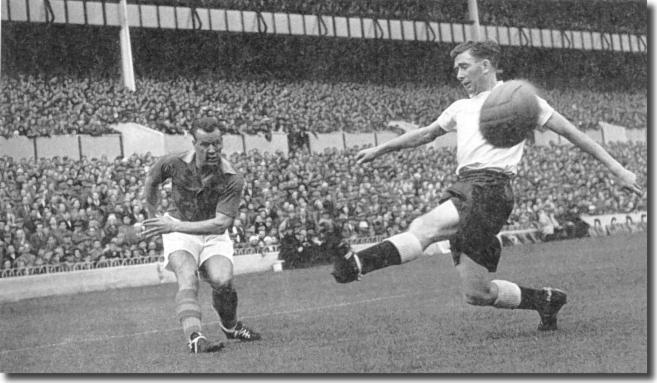 The
summer of 1956 was an optimistic and sunny time for those who loved football
in West Yorkshire - Leeds United had one of the most promising young managers
in the British game in former England international schemer, Raich
Carter, probably the most sought after playing talent in British football,
if not the world, in the lethal Welsh forward John
Charles, and a gifted and youthful side. But the biggest buzz came
from the team's success in finally regaining the First Division spot they
had lost in 1947.
The
summer of 1956 was an optimistic and sunny time for those who loved football
in West Yorkshire - Leeds United had one of the most promising young managers
in the British game in former England international schemer, Raich
Carter, probably the most sought after playing talent in British football,
if not the world, in the lethal Welsh forward John
Charles, and a gifted and youthful side. But the biggest buzz came
from the team's success in finally regaining the First Division spot they
had lost in 1947.
They had come late on the rails at the tail end of the 1955/56
season to win eight of their final nine games and emerge as runners
up behind long time Second Division pace setters Sheffield Wednesday.
Charles hit 12 goals in those nine matches, and finished top scorer with
29, receiving sterling support from the veteran Harold Brook and the robust
Albert Nightingale.
The defensive set up had been extremely consistent and reliable with
goalkeeper Roy Wood, full-backs Jimmy Dunn and Grenville Hair, and the
half-back partnership of Archie Gibson, Jack
Charlton and Eric Kerfoot missing just 9 matches between them in the
period since Gibson had returned to the side after injury on December
10, 1955.
Manager Carter kept that side together, supported by the wing play of
George Meek and Jack Overfield, for the opening day battle of 1956/57,
at Elland Road against Everton. 31,379 eager fans turned up for the game,
excited at the prospect of top flight action, despite their apprehension
about how their team would stand up to the rigours of action at the higher
level.
Brook and Nightingale had First Division experience from their time elsewhere,
but for the rest it was a totally new challenge. However, such concerns
were soon forgotten as United ran out easy 5-1 victors with Brook grabbing
a 21 minute hat trick after Overfield and Charles had opened the scoring.
The confidence built up in the triumphant spring had been carried over
into the new campaign and the eager young upstarts simply overwhelmed
their supposedly superior opponents.
However, the day was not an unqualified triumph as Nightingale suffered
a knee injury which proved so serious that he was never to play again.
The Rotherham born forward had been among the best inside forwards of
the post war period and bagged 48 goals for Leeds in 130 matches after
arriving from Blackburn Rovers in October 1952.
The loss of such a prominent player did nothing to curb United's enthusiasm
for their new surroundings and a mid week win at Charlton with two goals
from Charles saw them surprisingly top the table. This was a completely
unexpected turn of events, but it looked likely to be a flash in the pan
when United played their next match, also in London, finishing on the
wrong end of a 5-1 rout at Tottenham Hotspur.
There were knowing winks and nudges, and predictions that the upstarts
were about to be found out, but when Leeds trounced Charlton 4-0 in a
return match at Elland Road, they were back up to fourth spot in the table,
just a point behind Spurs, reigning champions Manchester United and Birmingham.
They drew their next match 0-0 at home to Chelsea, who had won the League
in 1955, and then lost by the only goal at FA Cup holders Manchester City.
Then three wins in a week saw them rise to second spot, just a point behind
leaders United. Leeds had proven to be unexpectedly 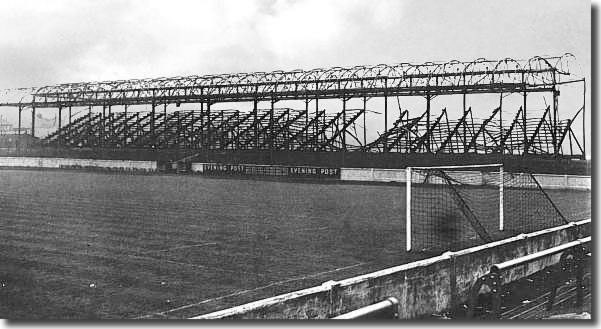 durable
and John Charles was demonstrating that he could easily handle life at
the top with nine goals in his first nine games.
durable
and John Charles was demonstrating that he could easily handle life at
the top with nine goals in his first nine games.
This was thrilling stuff, indeed, but as the season moved into the second
half of September, something happened which was to have a profound impact
on the football club and drastically change the course of events for the
next few years.
During the early hours of Tuesday, 18 September, a fire caught hold of
the Elland Road stadium and gutted the West Stand. The fire was so ferocious
that large sections of the pitch were scorched by the heat. The blaze
consumed the entire structure, offices, kit, club records, physiotherapy
equipment, dressing rooms, directors' rooms and press box. All that remained
was a charred skeleton of twisted, smouldering metal.
back to top
Fish and chip shop proprietor Arnold Price, the father in law of full
back Jimmy Dunn, whose premises were opposite the main gates, dashed barefoot
and pyjama clad to raise the alarm, but it was too late and nothing could
be saved. The stand roof had already collapsed into the seating area before
the fire brigade arrived. Damage was estimated at £100,000, and the club's
insurance cover had been woefully inadequate.
As the players helped clear up the rubble and wreckage during the week,
it was clear that it would be impossible to salvage the 2,500 seater stand
and, after a five hour board meeting, the directors decided to launch
a public appeal to build a new stand with assistance from Leeds City Council.
Eventually the appeal raised £60,000 and at the start of the following
season, a new £180,000 West Stand was unveiled, but for now the club,
which had always operated in an environment where finances were tight,
was in a sorry state. The financial situation eventually prompted the
club to part with John Charles, their prize asset.
For the moment, though, there was the more pressing issue of preparing
for the next game, at home to Aston Villa. Manager Raich Carter was determined
that the promising run of form should not be halted by events off the
pitch and decided that the match should go ahead as scheduled. He immediately
ordered 40 pairs of boots for his players, giving them strict instructions
that they should be worn as much as possible to break them in before the
game. United's injured players were treated in the home of former trainer
Arthur Campey, who had set up locally in private practice.
The fire ravaged stand was cordoned off and the Leeds and Villa players,
together with the match officials, changed in the dressing rooms of the
Whitehall Printeries sports ground in Lowfields Road before boarding a
coach which took them the short distance to Elland Road where they picked
their way through the burnt out shell of the stand to reach the pitch.
'The atmosphere was very odd,' said Charles. 'Running out was funny -
you went into the car park then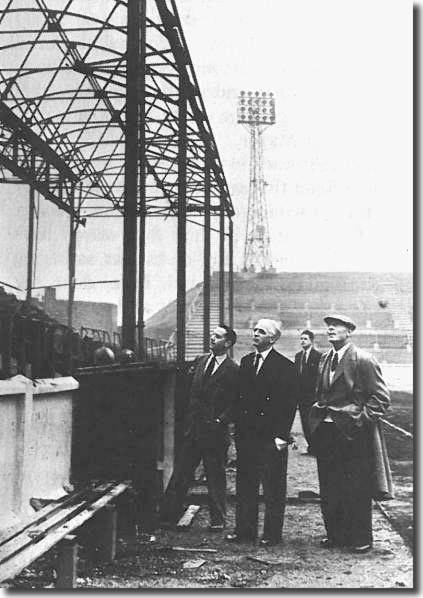 into nothing. We all had new boots and had to soak and wear them in the
days before, kicking the ball like hell to get them ready in time.'
into nothing. We all had new boots and had to soak and wear them in the
days before, kicking the ball like hell to get them ready in time.'
The Times reported the day thus: 'It was rather fun at Elland
Road on Saturday. Things had gone out of their normal groove. Even those
usually unmoving and efficient characters at the entrances, who tear huge
chunks off tickets, were not quite sure of themselves. The Press were
supposed to have sat like sparrows along a row of benches by the touchline.
Nobody quite knew the arrangements. Not that it could have mattered two
straws; indeed, it would have been pleasant in the open sunshine of a
sultry day. Yet in the end, with a typical British genius for improvisation,
all was settled, and into the bargain Leeds won a victory that could well
have been wider, but at least was sufficient to keep them on Manchester
United's heels at the top of the championship.
'The cause of all the bother, of course, was the fire in the dawn of
last Tuesday that burnt the old main stand to the ground. It was something
that had been long overdue. At any rate, there the charred remains of
it stood in the sunlight, a ring of metal girders looking for all the
world like the dark skeleton of a whale. Everything had gone up in smoke:
offices, dressing rooms, equipment, the generators for the floodlighting
system. Now the teams changed at a local sports ground down the road,
arrived by coach, and used the same vehicle for half time repairs and
tactical reassessment. Leeds, of course, looked as fresh as paint in their
latest attire. All that was wrong was their new boots. They were scarcely
shooting boots.
'However, there was Charles. On a field cut by the shadows of that brooding
skeleton he alone seemed an incendiarist. He was the one man capable of
setting the match alight in sudden gusts. What a figure he is and what
a player! There have been some outstanding all rounders in the history
of world football. Nudger Needham, of Sheffield United, in the long ago,
who gained England caps in many positions; more recently, Carey, of Manchester
United and Ireland. Among contemporaries there are Ocwirk and Hanappi,
the Austrians. Yet none of these, it would seem, could outmatch Charles
for power.
'Hewn, as it were, from the granite of some Welsh mountainside, Charles
has the stature to influence a match vastly. Whether he has the consummate
artistry of a Matthews to take a game and delicately shape it to his own
will is an argument that could develop until the dawn creeps in. Yet now,
as so often before, Charles once more proved himself a match winner in
his own right. The previous Saturday his two goals overcame Wolverhampton
Wanderers in the Midlands. Now his goal at the nineteenth minute of a
drowsy afternoon beat Aston Villa. More than that. At the turn of a card
he might have scored three or four times. Only inches one way or the other
and some great saves by the agile Sims kept Aston Villa in the hunt as
Charles caught sudden whiffs of inspiration.
'Leeds are not necessarily all Charles, but they are built around him
and they play to him cleverly. What is more they have a strategem. It
concerns Brook, Forrest and Charles himself, their inside forward trio.
They revolve, each one at any moment suddenly becoming the centre forward,
rather like crop rotation. It clearly carries the element of surprise
and but for some determined defensive packing by the Villa, the cover
tackling of Baxter, the alertness of Sims under his crossbar, and some
untidy and unlucky finishing it could have been all over by the end of
the first hour.
'Certainly Aston Villa kept at it bravely to the end. Indeed, they created
two chances, either of which could have finally helped them to share the
battle. Once in the first half Sewell, always alert and the ringmaster
of the Midland attack, pounced on an ill advised square pass by Dunn -
a full back who too often fluffed his lines against McParland - only to
see his shot finely turned away by Wood after he had galloped clear of
all opposition. Later Dixon missed an open target from Smith's diagonal
cross from the byeline. But for the most part Villa attacked crabwise,
moving the ball far too much laterally and even backwards, tactics that
hardly worried a Leeds defence, at the heart of which Marsden was always
cool and calculating.
'The left-footed dribbling of Overfield and some intelligent touches
by Brook through the middle brought their own patches of sunshine to the
Leeds attack. But it was Charles really who, every now and then, lifted
the match out of a rut, particularly before half time. In that period
he breasted down a cross by Forrest from the right to slash home the decisive
goal, having started the move in midfield himself; thrice also he brushed
all defence aside by a judicious mixture of pace and weight to bring Sims
full length and generally kept the Villa defence in a state of acute indigestion.
'Later on he pretended to lie doggo, a tactical ruse to lull the enemy
into false security. Suddenly he would crash into the picture again, a
battleship with the manoeuvrability of a destroyer. A 25-yard rocket that
stretched Sims to his fingertips and a shot onto the posts almost found
the mark again. But somehow or other the Villa covered up, sometimes perhaps
not knowing how they did so, especially when Aldis twice within a minute
got in the way of certain goals from Overfield and Brook. Leeds, unbeaten
at home, seems an empty place for visitors these days; especially for
full-backs who kick the ball into the stand.'
back to top
It would have been understandable if Leeds had started to wane after
their astonishing opening burst, given the inconvenience of having to
work around the aftermath of the fire. Indeed, following the Villa match
it was a further six weeks before the side's next win, by 3-2 away to
Newcastle on 3 November, but that victory took Leeds back up to fourth,
five points behind leaders Manchester United, and tucked in just behind
Tottenham Hotspur and Blackpool. After a John Charles hat trick the following
week secured a 3-1 win at Elland Road in the Yorkshire derby against Sheffield
Wednesday the next test was the big one, away at Old Trafford against
the league leaders.
The Busby Babes were very much at the peak of their powers. Under the
leadership of Scottish manager Matt Busby, United had romped home in the
title race the previous season and were once again pace setters. They
boasted a clutch of youthful stars and were easily the most attractive
team of their time, with Tommy Taylor, Duncan Edwards, 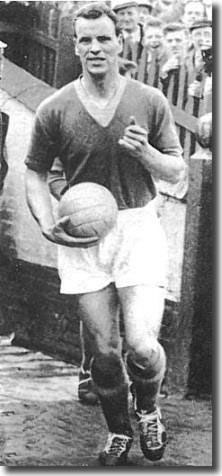 Eddie
Colman, Dennis Violett, Roger Byrne and Jack Charlton's gifted kid brother
Bobby all household names. They were England's first challengers for the
newly founded European Cup competition, to be played for by the national
champions of each country. United competed against the advice of the Football
League and announced their arrival with a 10-0 victory against Anderlecht
in the first round.
Eddie
Colman, Dennis Violett, Roger Byrne and Jack Charlton's gifted kid brother
Bobby all household names. They were England's first challengers for the
newly founded European Cup competition, to be played for by the national
champions of each country. United competed against the advice of the Football
League and announced their arrival with a 10-0 victory against Anderlecht
in the first round.
For all of United's magnificence, however, Leeds acquitted themselves
well in a 3-2 defeat with Frank McKenna scoring once and Charles hitting
a penalty before a crowd of 52,401. And despite the disappointing reversal
Leeds remained stubbornly in fourth place, with Charles among the leading
scorers in the division, returning sixteen goals from the sixteen matches
he had played.
23-year-old McKenna had been an amateur England international with Bishops
Auckland and won an Amateur Cup medal in 1956 before turning professional
when he arrived at Elland Road in the summer. He had scored a couple of
goals on his first team debut in the victory at Newcastle and enjoyed
a good little run in that spell, although he never established himself
despite the absence of Nightingale, and it was the strong running Bobby
Forrest who generally joined Charles and 35 year old Harold Brook to spearhead
the attack.
More than 39,000 fans packed into Elland Road on November 24 as two Charles
goals and another from Forrest secured a 3-3 draw at home to Arsenal,
and then the Welshman scored twice more in a 4-1 thrashing of Portsmouth
to take Leeds back up to third spot.
On Boxing Day, Brook grabbed a hat trick and Charles yet another double
as Leeds pulled off a memorable Elland Road triumph, by 5-0 against Blackpool.
In a season of great goals, perhaps Charles' best came in the game. The
Yorkshire Post reported: 'A sensational opening set the home side
on their victory march, the ball travelling in 13 seconds started off
from the kick off, from Brook, Forrest and Overfield to Charles, who took
the left winger's forward centre in his stride to crash the ball past
Farm from the acutest of angles.'
After the Blackpool win Leeds travelled to Chelsea's Stamford Bridge
to see out a remarkable year for the club on December 29. It was a difficult
match, played in atrocious weather, but Leeds returned home with a point
they didn't really deserve.
The Times: 'With only four minutes left Chelsea still held bravely
to the profit of McNichol's goal for them at the twenty third minute.
They were within a short stride of victory. Suddenly Charles swung on
his powerful frame to crash a shot against Matthews' goalpost: the rebound
stuck in the mud a few yards from the line guarded by at least three defenders.
But Armstrong, one of the day's heroes, playing his 352nd game for Chelsea,
a record for the club, surprised his goalkeeper with a sudden back pass
and there to his horror watched the ball trickle into his own net. So
Leeds were reprieved and stepped jauntily from their cell at the eleventh
hour.
'If that was the dramatic highlight the major feature of a hard match
fought on a surface of dark treacle was the dethronement of Charles, the
king of Leeds and Wales. Apart from that shot of his at the end he had
no voice in affairs. This was a change. As the minutes passed - some of
them dragging by as wearily as the players themselves in the clinging
mud - one constantly looked for his commanding figure to explode into
some breathless feat. But no. A crowd of over 43,000 was doubtless explained
by his presence. They came perhaps expecting - and fearing - the worst
for Chelsea. Instead, they were confronted by a giant with feet of clay.
'No doubt the conditions had a lot to do with Charles' unusual eclipse.
But what the mud began Saunders, at left half, completed with a will by
his swift, hard tackling and relentless hunting in midfield. The giant,
paradoxically, fell under the shadow of a lesser mortal so that it was
mainly Saunders and Armstrong at wing half who between them shut out the
Leeds attack and set their own young men galloping through the mud ahead
of them. And when Leeds, with high, long passes, sought the head of Charles
in the air, Livingstone was there to complete the job of execution.
'Leeds, with their great man now mute and reduced to spasmodic attacks
by the diminutive Meek and Overfield down the flanks, at least took the
opportunity of explaining that they possess a neat, well drilled defence
in which Charlton and Gibson shone at half back. They worked themselves
out of difficulties with thoughtful positional play rather than by heavy
handed methods. That was the best part of their game and it was fully
taxed by the eager young Chelsea forwards. A lesser defensive unit might
well have surrendered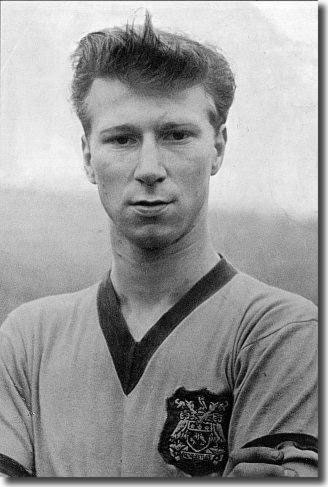 to the pressure put on it before McFarlane's unhappy departure necessitated
Chelsea switching McNichol from inside right to right back.
to the pressure put on it before McFarlane's unhappy departure necessitated
Chelsea switching McNichol from inside right to right back.
'Up to the penalty area this lively young Chelsea line frequently moved
the ball quite fluently. But a lack of experience prevented them overcoming
both the conditions and the resourceful Leeds defenders at the critical
moments, so that in the end we were left with a lot of stray, untidy ends
to a straggling game. But once McNichol had put the finishing touch to
Nicholas' header from a free kick by Armstrong midway through the opening
half it looked to be Chelsea's match and a happy farewell to 1956. Once,
certainly, Forrest missed a sitter for Leeds, hitting Matthews' left hand
post from no more than six yards. But that apart, Leeds in their yellow
shirts looked like daffodils out of season and wilting in the unfriendly
cloying earth. Even with their 10 men Chelsea continued to hold the whip
hand throughout the second half till that last sad twist to Armstrong's
day.'
After securing their undeserved point, Leeds' fortunes started to take
a nose dive. The following Saturday they met a struggling Cardiff City
side at Elland Road in the third round of the FA Cup. It was a straight
repeat of the previous year's tie at the same stage, and the result was
also duplicated, with Charles' goal being scant consolation for a 2-1
defeat. The match was Jack Charlton's last for more than two months after
he suffered an injury. The defender's deputy, Jack Marsden, struggled
to replace a player who was building a name for himself despite a difficult
streak - the following week saw Leeds suffer a 5-3 defeat away to Bolton
Wanderers, despite another couple of goals from Charles, and it was February
16 before Leeds managed another victory, avenging their Cup defeat by
thrashing Cardiff 3-0.
That was a rare win, however, as Leeds struggled through the Spring,
sliding steadily down the table, although each precious victory was memorable
in its own way, with Portsmouth being routed 5-2, Charles hitting his
second hat trick against Sheffield Wednesday in a 3-2 win (taking his
tally of trebles for Leeds to an astounding 11) and a closing day home
victory over Sunderland.
By the time of the game against the Wearsiders, it was known that the
Leeds directors had finally bowed to the inevitable, and agreed to sell
their star player, the mighty John Charles. The Welshman had emerged as
the top scorer in division one, proving that he could cut it in the top
flight as well as the second division, eventually finishing with 38 goals.
Clubs throughout Europe had been chasing Charles for years, but always
the board had remained firm and insisted they would not sell. However,
the earlier fire at the ground had left the club more desperate than usual.
When the club learned the cost of replacing the West Stand, it was accepted
that drastic action would be required.
back to top
Richard Coomber from King John: 'For the final game of the Home
International Championships in 1957 the Welsh selectors decided it was
time to go with youth so, after being chosen for all 43 internationals
since the war and playing in 41 of them, Alf Sherwood was dropped. John
Charles was picked as skipper for the first time and as he led the side
out at Windsor Park, Belfast, he was scrutinised from the stands by one
of the wealthiest men in Europe.
'Signor Umberto Agnelli was 22 years old, a member of the fabulously
wealthy family which owned the Fiat car company. He concentrated on running
Juventus Football Club which they also owned. He flew into Belfast to
cast a final eye over the man they had been thinking of signing for over
two years.
'The first interest came from a dapper figure, Gigi Peronace, the agent
whose brief was to scour Europe for the best players, especially those
who could unlock the formidable Italian defences. He had already been
responsible for the £35,000 move of Eddie Firmani from Charlton to Sampdoria.
It was Peronace who first identified John Charles as the perfect man for
the job.
'News that Juventus were interested alerted some of the other big clubs
around Europe and Charles found himself subject to endless rumours involving
Real Madrid, Inter Milan and other clubs who could afford what was bound
to be a massive fee.
'The local paper was filled with correspondence, some saying Leeds should
use the money to rebuild the team, others like TB of Armley, arguing:
"We are now in grave danger of losing the city's greatest attraction
since the Town Hall was built."
'Things came to a head on 10 April 1957 when Leeds announced that, while
they would not sell Charles to another club in England, they would not
stand in his way if one of the big clubs in Europe came in for him.'
In the end, the fee agreed was a world record one, £65,000, by far the
biggest deal that Leeds United had ever been involved in, and one which
significantly improved their bank balance, although it left them missing
possibly the world's most talented player.
Charles could have been forgiven for letting his mind wander, but one
could not fault his commitment following the deal. He had games still
to play 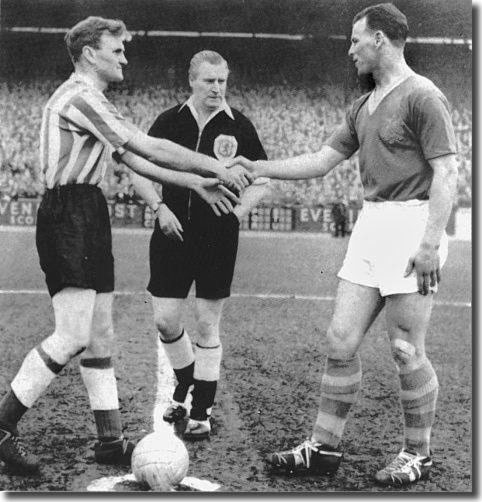 for
Leeds over the last month of the season and put as much effort into his
play as ever he had. He was on target twice in a depressing 6-2 defeat
at Birmingham in the penultimate match of the season, but still looked
forward to leading out Leeds for one final time, at home to Sunderland.
for
Leeds over the last month of the season and put as much effort into his
play as ever he had. He was on target twice in a depressing 6-2 defeat
at Birmingham in the penultimate match of the season, but still looked
forward to leading out Leeds for one final time, at home to Sunderland.
The Yorkshire Post reported the historic game thus: 'From a footballing
point of view, John Charles could not have made a more fitting end to
his career at Elland Road. He scored the second and third goals United
registered, making his total in the Football League this season 38 and
he had to fight for every advantage he gained.
'Sunderland badly needed the points. They could not allow Charles to
have a spectacular match solely for sentiment's sake. Yet Charles did
have a spectacular match.
'I shall never forget the way in which he overtook Daniel, the upstanding
Sunderland centre-half, as they both raced towards the Sunderland goal
and, as Daniel tried to keep the ball close to him, Charles calmly stole
it and without a check in his stride, without deviation. It seemed as
though one player merged into the other; red shirt was leading with the
ball, suddenly a blue shirt was in front and there was no faltering. That
was a new move in the Charles repertoire; I thought I had seen them all.
'Both his goals were the reward of opportunism, both were scored only
because an artist placed the ball. In each case he had to outpace the
opposition.
'For most of the match Charles suffered the unobtrusive marking of Daniel,
who has played so often behind him for Wales that he must know his every
move, of Anderson, Sunderland's inside right, and occasionally of Elliott
who did nothing else of note. Yet Charles scored two goals.
'He was set an example by the spectacular shot from 30 yards' range with
which Harold Brook enlivened a match, often drab, to score the first goal
after 55 minutes. The way Brook shoots from the middle of the field makes
me wonder why United ever play him anywhere else than at centre forward.
It ended a neat passing bout.
'Had O'Brien been in better shooting form - or had more luck - the score
would have been more impressive, for this latest recruit to United's forward
line hit two or three shots over the bar that ought to have gone under
it. Yet he worked well; it was perhaps his best game so far.
'Sunderland so frequently mastered a shaky defence in which Dunn was
much the most impressive figure that, but for the sound goalkeeping of
Wood, they would have scored more than the goal Grainger gave them between
Charles' first and second. Wood made four saves of outstanding merit from
a forward line too anxious to do the right thing quickly. Revie, except
in finishing, was Sunderland's best player; inside left Clarke looked
to be promising, but the defence was not good except for Fraser.
'So the most remarkable season in United's history ended - a season which
started with a newly promoted side almost reaching the top of the table,
which was marked by a disastrous firs, by the wags christening it Charles
United and by a transfer which involves £80,000.
'Next season there will be no Charles to write about for the first time
for nearly a decade. How odd it will seem. On recent form it is hard to
say who will fill the gap.'
It was a fitting end to a remarkable association between player and club
- Charles had scored an amazing 154 goals in almost a decade and shown
himself to be a wondrous talent. His final season at Elland Road had seen
the club tilt at windmills as they had rarely done before - they finished
eighth, and 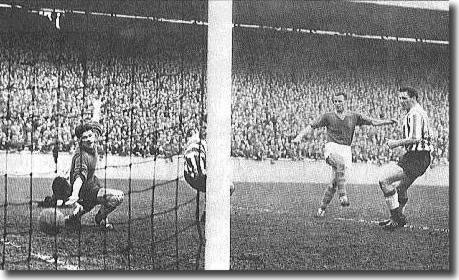 but
for a run of just a single point from the five games prior to the Sunderland
match could conceivably have enjoyed their best ever finish. The lost
nine points could have put them level with Blackpool in fourth spot.
but
for a run of just a single point from the five games prior to the Sunderland
match could conceivably have enjoyed their best ever finish. The lost
nine points could have put them level with Blackpool in fourth spot.
However, on the negative side the departure of such an immense talent
represented a grievous wound to the club's ambitions and manager Raich
Carter could only scratch his head and wonder where (or rather whether)
he would find a suitable successor. But for the moment the problem lay
in the future - Leeds had money in the bank, a wonderful new stand and
a place at football's top table. Life was just grand!
Other Football Highlights from 1956/57
- Reigning champions Manchester United accepted the FA's invitation
to take part in the second staging of the European Cup against the advice
of the Football League. United beat Anderlecht, Borussia Dortmund and
Bilbao before losing to holders Real Madrid in the semi-finals. Real
went on to retain the trophy by beating Italy's Fiorentina in the final
- United retained their league title, finishing eight points above second
placed Tottenham, but failed to become the Twentieth Century's first
Double winners when they lost 2-1 to Aston Villa in the FA Cup final.
United keeper Ray Wood was injured after six minutes and had to play
on the right wing with Jackie Blanchflower taking over in goal
- Shock waves went through English football in April when Juventus,
the wealthy Italian club, purchased John Charles from Leeds for £65,000,
a new world record fee and more than double the previous British record
- Stanley Matthews played his 54th and last international for England
at the age of 42
back to top












 The
summer of 1956 was an optimistic and sunny time for those who loved football
in West Yorkshire - Leeds United had one of the most promising young managers
in the British game in former England international schemer, Raich
Carter, probably the most sought after playing talent in British football,
if not the world, in the lethal Welsh forward John
Charles, and a gifted and youthful side. But the biggest buzz came
from the team's success in finally regaining the First Division spot they
had lost in 1947.
The
summer of 1956 was an optimistic and sunny time for those who loved football
in West Yorkshire - Leeds United had one of the most promising young managers
in the British game in former England international schemer, Raich
Carter, probably the most sought after playing talent in British football,
if not the world, in the lethal Welsh forward John
Charles, and a gifted and youthful side. But the biggest buzz came
from the team's success in finally regaining the First Division spot they
had lost in 1947. durable
and John Charles was demonstrating that he could easily handle life at
the top with nine goals in his first nine games.
durable
and John Charles was demonstrating that he could easily handle life at
the top with nine goals in his first nine games. into nothing. We all had new boots and had to soak and wear them in the
days before, kicking the ball like hell to get them ready in time.'
into nothing. We all had new boots and had to soak and wear them in the
days before, kicking the ball like hell to get them ready in time.' Eddie
Colman, Dennis Violett, Roger Byrne and Jack Charlton's gifted kid brother
Bobby all household names. They were England's first challengers for the
newly founded European Cup competition, to be played for by the national
champions of each country. United competed against the advice of the Football
League and announced their arrival with a 10-0 victory against Anderlecht
in the first round.
Eddie
Colman, Dennis Violett, Roger Byrne and Jack Charlton's gifted kid brother
Bobby all household names. They were England's first challengers for the
newly founded European Cup competition, to be played for by the national
champions of each country. United competed against the advice of the Football
League and announced their arrival with a 10-0 victory against Anderlecht
in the first round. to the pressure put on it before McFarlane's unhappy departure necessitated
Chelsea switching McNichol from inside right to right back.
to the pressure put on it before McFarlane's unhappy departure necessitated
Chelsea switching McNichol from inside right to right back. for
Leeds over the last month of the season and put as much effort into his
play as ever he had. He was on target twice in a depressing 6-2 defeat
at Birmingham in the penultimate match of the season, but still looked
forward to leading out Leeds for one final time, at home to Sunderland.
for
Leeds over the last month of the season and put as much effort into his
play as ever he had. He was on target twice in a depressing 6-2 defeat
at Birmingham in the penultimate match of the season, but still looked
forward to leading out Leeds for one final time, at home to Sunderland. but
for a run of just a single point from the five games prior to the Sunderland
match could conceivably have enjoyed their best ever finish. The lost
nine points could have put them level with Blackpool in fourth spot.
but
for a run of just a single point from the five games prior to the Sunderland
match could conceivably have enjoyed their best ever finish. The lost
nine points could have put them level with Blackpool in fourth spot.